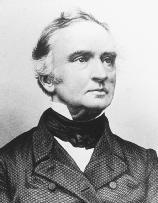Justus von Liebig

GERMAN CHEMIST
1803–1873
Justus von Liebig, one of the founders of modern chemistry, was born on May 12, 1803, in Darmstadt, Hesse, Germany. His father was a manufacturer of drugs and paints. As an adolescent Liebig performed many experiments using materials from his father's business while neglecting other studies. He was apprenticed to an apothecary at age fifteen; however, his real interest was chemistry. He enrolled at the University of Bonn in 1820 to attend the lectures of Wilhelm Kastner. When Kastner left for the University of Erlangen, Liebig followed him there and received his doctoral degree in 1822 after only two years of study.
Liebig soon realized that his knowledge of chemistry was deficient and using the patronage of the grand duke of Hesse was able to study in Paris from 1822 to 1824. Paris was the leading center for the study of chemistry at this time, and here Liebig was able to attend the lectures of such famous chemists as Joseph Gay-Lussac, Louis Thénard, and Pierre Dulong. Parisian chemistry stressed a rigorous and quantitative approach that was lacking in European chemistry. In Paris Liebig had the opportunity to work in the laboratory of Gay-Lussac, where he acquired skills in the elemental analysis of inorganic and organic compounds, as well as in the systematic methodology of chemical research.
In 1825 Liebig returned to Germany and was offered the professorship of chemistry at the University of Geissen. He stayed in Geissen until 1851, at which time he was called to the chair of chemistry at the University of Munich where he remained until his death on April 18, 1873.
In Geissen Liebig drawing from his studies in Paris established the model for chemical education that was soon copied by other German educators. His students learned by working in the laboratory with their mentor, starting with simple procedures, working their way through more complex exercises, and finally graduating to their own independent research.
One of Liebig's many achievements at Geissen was the development of more efficient combustion techniques for the elemental analysis of organic compounds. The impetus for this was his inability to get a good result in his analysis of a compound he had isolated from urine (which he had named hippuric acid) using the conventional methods that were available to him. These methods, which were tedious and time-consuming, included the use of very small amounts of a given sample, which amplified the experimental error. In 1830 Liebig devised a technique that allowed the use of larger samples and he was able to quantify the amounts of carbon and hydrogen in organic compounds. The trapping of the gaseous combustion products water vapor and carbon dioxide on pre-weighed absorbents was part of his technique. This procedure greatly reduced error and was simple enough so that Liebig's students were able to analyze all types of organic compounds almost routinely, which greatly enhanced the existing knowledge of the variety of organic compounds in nature.
Liebig pioneered methods for the analysis of nitrogen, sulfur, and halogens in organic compounds, in addition to his contributions to the analysis of carbon and hydrogen in these compounds. Liebig was the founding editor of one of the first chemical journals, Annalen der chemie in 1832.
SEE ALSO Gay-Lussac Joseph-Louis ; Organic Chemistry ; Proteins .
Martin D. Saltzman
Bibliography
Brock, W. H. (1997). Justus von Liebig: The Chemical Gatekeeper. New York: Cambridge University Press.
Comment about this article, ask questions, or add new information about this topic: